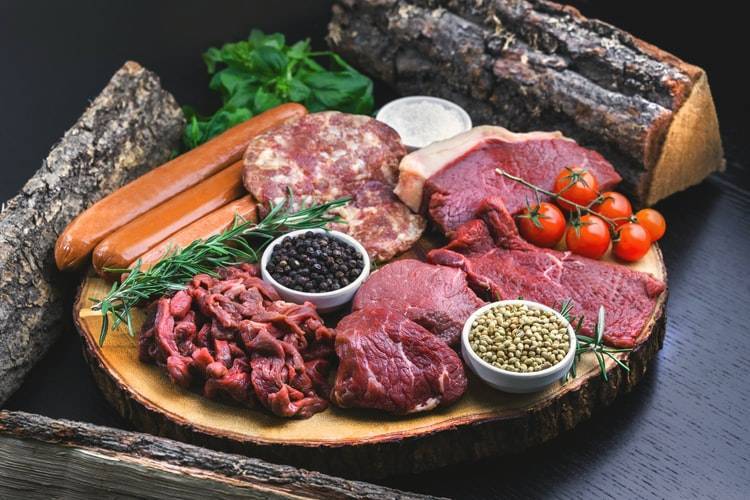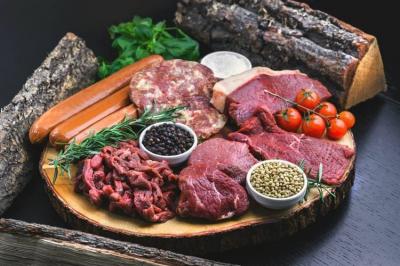Discussions about whether it is better to consume meat or follow a vegetarian diet are renewed periodically. Considering that more than half of the world's population is not vegetarian, it is not surprising that there are many meat-based dishes, making it challenging—not impossible—to adopt a vegetarian lifestyle. Following a vegetarian diet has numerous health benefits, from reducing the risk of heart disease to type 2 diabetes. Choosing a different diet may be daunting; changing your eating habits and avoiding familiar foods can indeed be time-consuming, but the benefits are substantial.
According to a report published by Boldsky, the following health benefits can be achieved by completely abstaining from or reducing meat consumption:
### Benefits of Reducing Meat Consumption
The benefits of reducing or stopping meat consumption are both physical and emotional. Numerous studies have linked dietary cholesterol and saturated fats to cardiovascular diseases. Saturated fats are found in all meats and fish, while a vegetarian diet generally poses less risk to cholesterol levels and is low in saturated fats. While meat-based diets are often considered rich in proteins and other nutrients, they also have some negative effects. While adding meat to your diet occasionally may not significantly impact health, consuming a lot of meat without a proper balance with vegetables is not a healthy approach.
When mentioning meat consumption, the primary focus is usually on red meats such as beef, lamb, veal, venison, and goat meat. Boldsky outlines what happens to your body when you stop eating meat, either completely or by reducing it:
1. **Stomach Acidity**: Studies suggest that meat-based food products can stimulate acid secretion in the stomach, leading to conditions such as excess acidity, heartburn, headaches, and stomach pains. Meanwhile, a vegetarian diet is known to resist acid production in the stomach.
2. **Weight Loss**: According to studies, when meat-eaters switch to a vegetarian diet, they experience a significant (healthy) weight loss without much effort. Therefore, if you are struggling to lose a few kilograms, excluding meat from your diet may be beneficial. People following a vegetarian diet also tend to consume fewer calories and less fat.
3. **Gut Health**: Compared to non-vegetarians, people on a vegetarian diet have cleaner digestive tracts. The vegetarian diet helps promote the growth of healthy bacteria that line the intestines, preventing some digestive disorders, while meat-based diets may harm the intestines due to preservatives and hormones used in animal products.
4. **Type 2 Diabetes**: Studies indicate that the risk of developing type 2 diabetes is significantly higher in meat-eaters compared to those on a vegetarian diet. This is linked to hormones found in meats, and their iron and nitrate content, especially in red meats.
5. **Blood Cholesterol Levels**: Diets that include meat have very high levels of saturated fats, which are known to raise blood cholesterol levels. Elevated cholesterol levels can lead to serious conditions such as obesity, stroke, and heart disease.
6. **Boosting Immunity**: Experts believe that quitting non-vegetarian foods can reduce the inflammation occurring in our bodies. If an animal has a specific infection, it may transmit directly to humans after consuming its meat. A purely vegetarian diet is also known for its effectiveness in reducing inflammation and ulcers.
7. **Younger DNA**: It is said that a vegetarian diet builds a healthier DNA or genetic structure. Antioxidants and nutrients found in vegetables may also aid in repairing DNA damage and reducing cancer cell production. A vegetarian diet also helps slow the aging process of tissues, thus maintaining a youthful feeling.
8. **Increased Energy and Vitality**: After eliminating meat, many notice feeling less tired during the day. A meat-free diet helps shed weight and toxins, leaving a feeling of lightness and vitality.
9. **Heart Disease**: Results from numerous studies have shown the benefits of abstaining from meat for heart health, demonstrating that consuming saturated fats mainly found in meats and animal products increases the risk of heart diseases.
10. **Cancer**: Reducing the intake of red meat, especially bacon, sausages, and other smoked or processed meats, can help lower the risk of colorectal cancer. Regular consumption of red meat has also been linked to an increased risk of other cancers, including breast cancer.
### Negative Effects of a Meat-Free Diet
Nutrition experts explain that there are some negative effects to consider when reducing or quitting meat consumption, as follows:
- When stopping meat consumption, a person may experience deficiencies in iodine, iron, vitamin D, and vitamin B12. Consulting a doctor or nutritionist about dietary supplements that can be taken to compensate is advisable.
- A person may lose their taste sensation due to a deficiency in zinc, which the body obtains from red meat and shellfish.
- Proteins are crucial for muscle strengthening and recovery after exercise. Transitioning to a vegetarian diet might result in longer recovery times for muscles. Plant proteins need more time to take effect.
### Tips for Reducing Meat Consumption
- Introduce more nuts and seeds into your diet.
- Substitute red meats with chicken or fish, and eventually with vegetables.
- Add more grains and vegetables when cooking meat to reduce the amount of meat in each meal.
- Designate one day a week to be completely meat-free.




